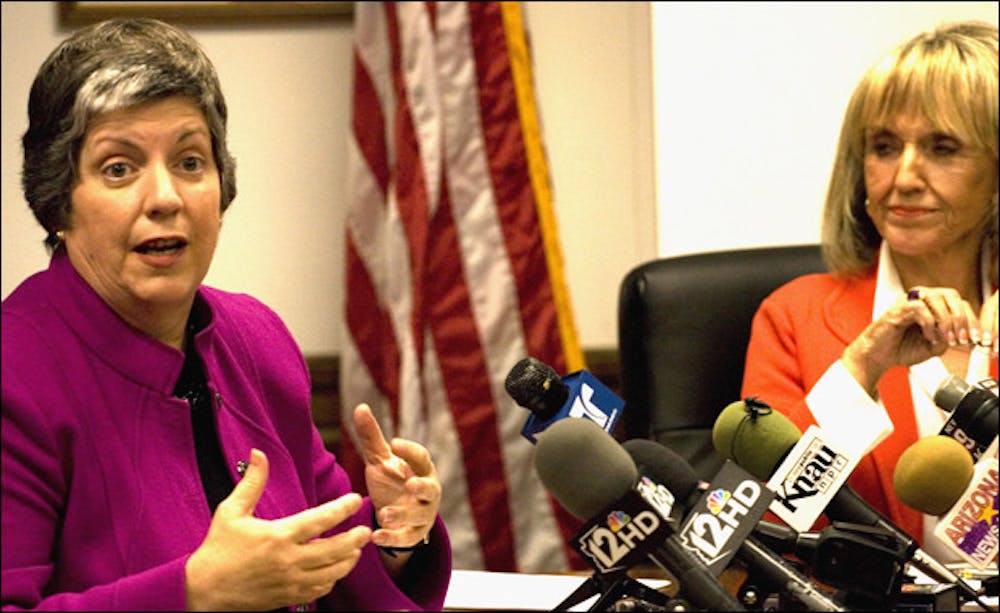After weeks of speculation, President-elect Barack Obama officially nominated Janet Napolitano as secretary of homeland security Monday.
“I am humbled and honored by … Obama’s invitation, and I am proud to accept it,” Napolitano said in a statement. “I believe that when called upon to serve — particularly at such a critical time in the history of our country — it is my duty as a citizen to step forward and say, ‘Yes.’”
Napolitano — who previously served as U.S. attorney for Arizona and Arizona attorney general — and the rest of the newly announced members of Obama’s national security team were introduced in a Chicago news conference.
Republican Secretary of State Jan Brewer, 64, will succeed Napolitano, 51, halfway through Napolitano’s second four-year term.
The change will mark a partisan switch for Arizona, currently struggling with a budget crisis that is expected to lead to sizeable budget cuts.
Napolitano said Brewer, who has spent more than two decades as a legislator, Maricopa County supervisor and secretary of state, “will need your support, and I pledge her mine.”
Brewer’s office did not return calls Monday. But speaking to reporters after Monday’s canvass of official election results, Brewer said she and Napolitano would meet later this week to plan a smooth transition.
“The people of our great state of Arizona deserve no less,” Brewer said.
The replacement will not happen immediately, however. Napolitano must wait for the U.S. Senate to confirm her appointment, which can’t happen until Obama is inaugurated on Jan. 20.
In the meantime, she is scheduled to deliver a State of the State address in January — a speech that usually details the governor’s objectives and priorities for the next legislative session. Afterward, she will present the Arizona Legislature with a budget proposal for the 2009-2010 fiscal year.
Brewer, speaking after the canvass, said Napolitano would be acting within her constitutional authority to give the address and propose a budget.
“She’s in charge. She’s the governor,” Brewer said.
The exact date when Brewer will take office is unknown, but when she does, she’ll face a state budget deficit currently projected at $1.2 billion.
Due in part to the state deficit, ASU has already taken about $60 million in budget cuts this academic year. As a result, programs and employees have been cut, and some colleges within ASU have proposed new student fees.
The University is currently preparing for a second round of budget cuts and doing everything it can to save, ASU President Michael Crow said.
“We’re making strategic layoffs, we’re changing services, we’re going to change the temperature of our buildings, we’re putting in solar power, we’re doing everything we possibly can to change the operating cost of the institution,” Crow said in an interview with The State Press editorial board on Nov. 20. “We’re lowering costs wherever we can.”
ASU College Republicans Committee Whip Lance Robinson said Napolitano hasn’t worked to control the big education issues like tuition increases.
“Brewer will make better changes regarding education that will be much more feasible,” Robinson said. “Some bills couldn’t be passed when they had to face Napolitano, so that can happen now.”
The political science senior called the change a good move for conservative leadership in the state.
“Anyone would be better than Napolitano,” Robinson said. “Brewer wants to actually keep tuition costs down.”
ASU Young Democrats Community Director Erica Pederson said she would be sad to see Napolitano go.
“Her veto power has been extremely important because the Legislature is Republican-controlled,” Pederson said. “I’m concerned about the Republicans passing all kinds of bills now that she’s gone.”
The political science and philosophy sophomore said she is also worried that Brewer will slash education funding because of the state’s large budget shortfall.
“I don’t want to be affected by education cuts; my classes are big enough already,” she said. “I hope education will continue to be an important issue, especially since Arizona has one of the weakest programs in the country.”
The Associated Press contributed to this report.
Reach the reporter at tessa.muggeridge@asu.edu




